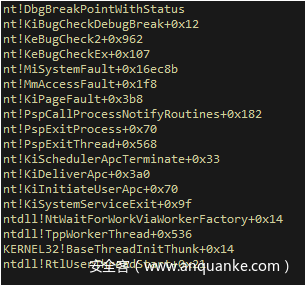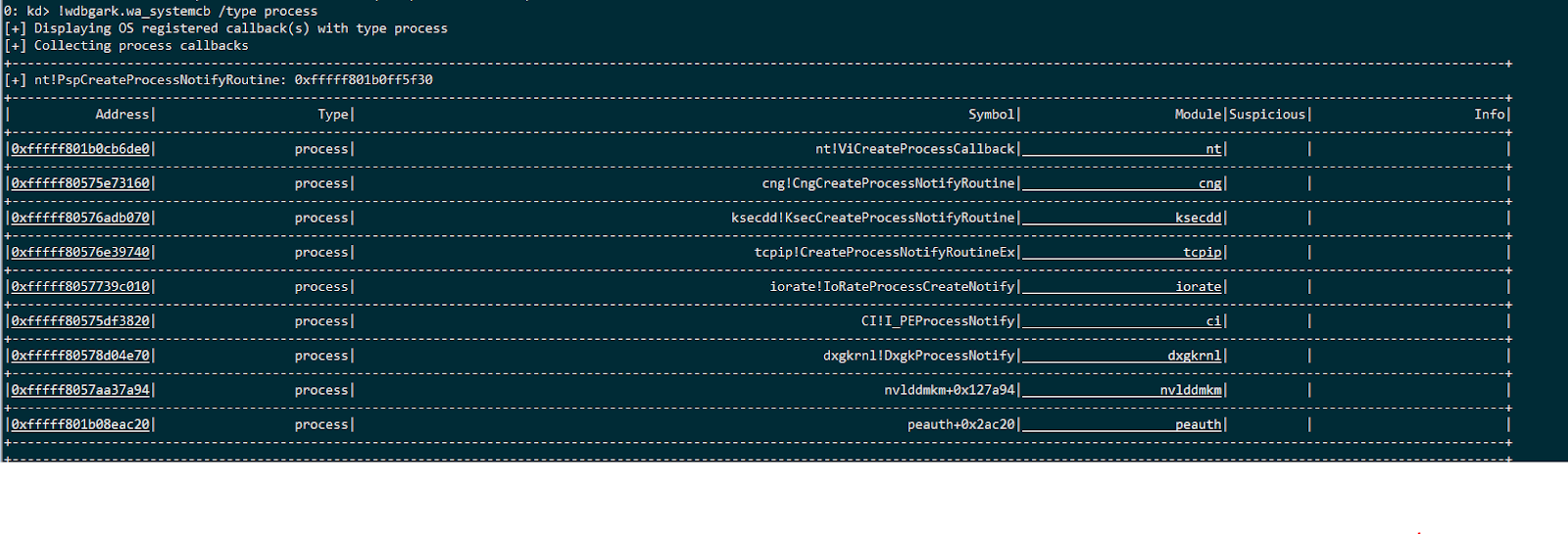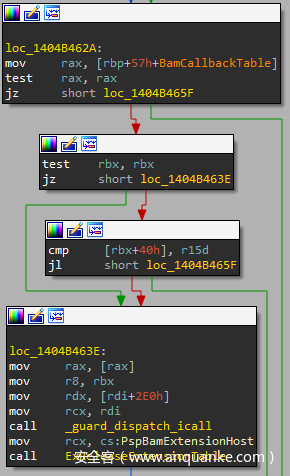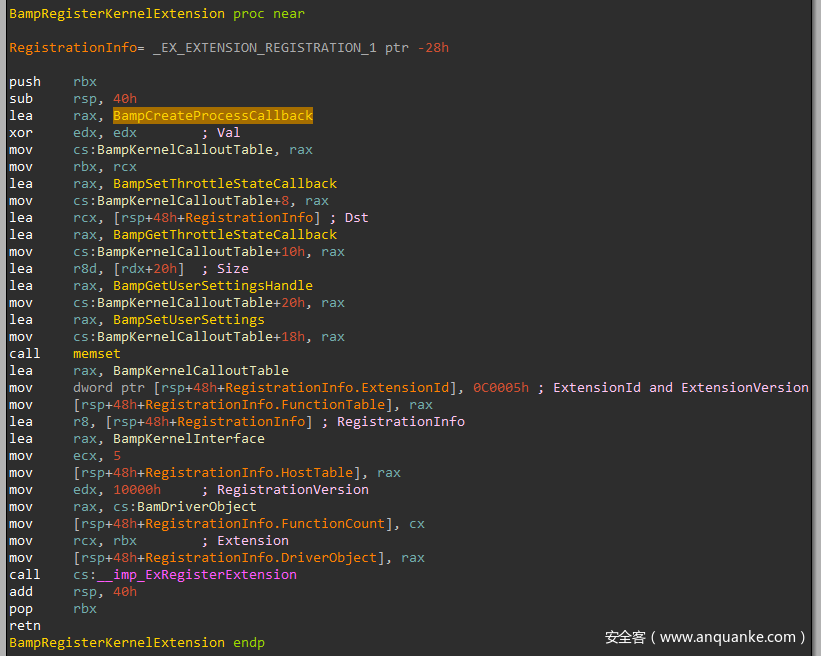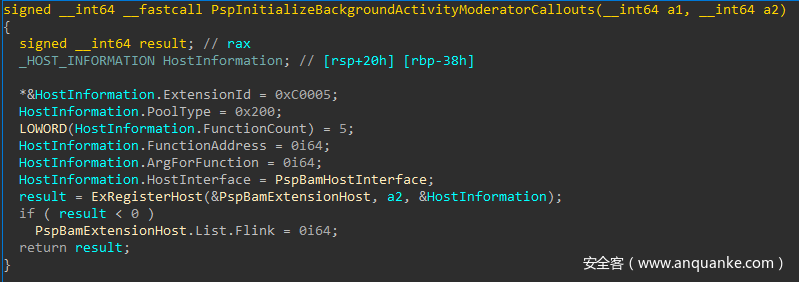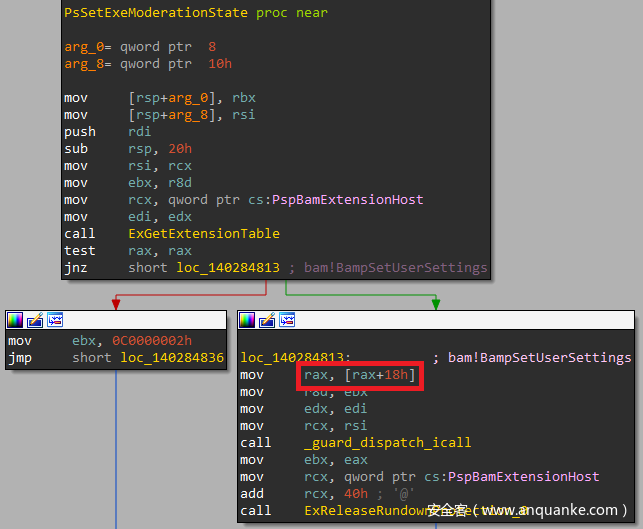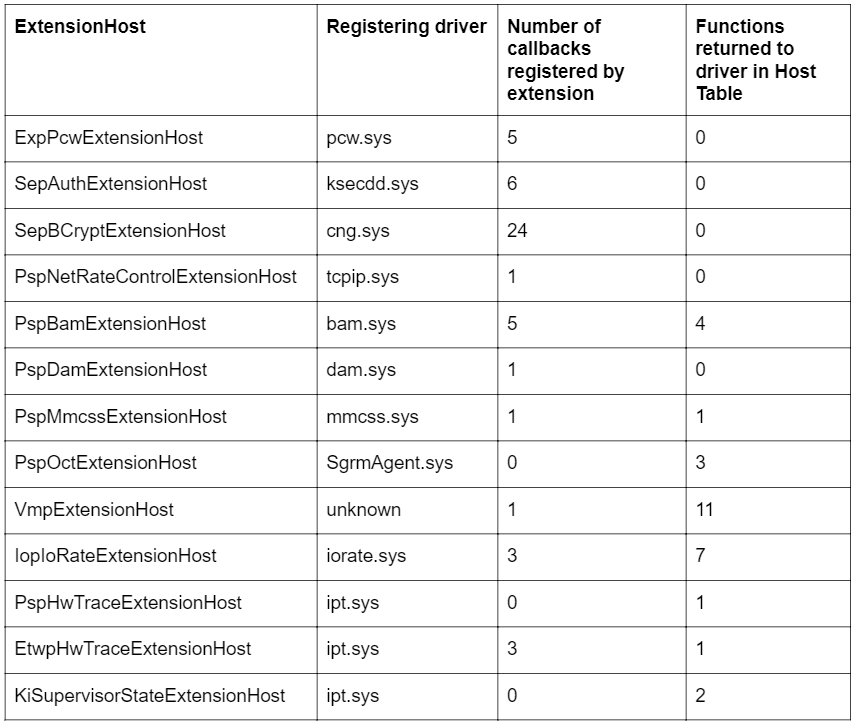一、前言
最近我需要写一个内核模式驱动,这种工作通常会让许多人恼怒不堪,无法从容处理(转述自Douglas Adams)。
与我之前写过的代码一样,这个驱动也存在几个主要的bug,会导致一些有趣的副作用。具体而言,该驱动会阻止其他驱动正确加载,导致系统崩溃。
事实证明,许多驱动会默认自己的初始化例程(DriverEntry)始终能够成功执行,当意外情况发生时并不具备相应的处置办法。j00ru在几年前的一篇博客中讨论了其中一些案例,并且其中许多案例仍可以在当前的Windows版本中找到关联线索。然而,这些bug驱动并不是我遇到的那个问题,并且j00ru对这些bug驱动的分析也比我更加全面。我关注的是其中一个驱动,进一步分析后,我开始研究“windows kernel host extensions”(Windows内核宿主扩展)机制。
二、初步分析
我们的目标是Bam.sys(Background Activity Moderator),这是Windows 10 1709(RS3)版新引入的一个驱动。当该驱动的DriverEntry中途失败时,系统会出现崩溃,相关调用栈情况如下所示:
从崩溃转储信息中,我们可知Bam.sys注册了一个进程创建回调函数,并且在卸载前忘记取消注册该回调。因此,当进程被创建/终止时,系统会尝试调用该回调函数,结果就碰到无效指针,发生崩溃。
这里有趣的并不是系统崩溃这件事,而是Bam.sys注册该回调的过程。通常情况下,驱动会通过nt!PsSetCreateProcessNotifyRoutine(Ex)来注册进程创建回调函数,将回调函数加入nt!PspCreateProcessNotifyRoutine数组中。然后,当进程被创建或者终止时,nt!PspCallProcessNotifyRoutines会遍历该数组,调用已注册的所有回调。然而,如果我们在WindDbg中运行!wdbgark.wa_systemcb /type process命令(参考wdbgark),会看到数组中并不存在Bam.sys所使用的回调。
相反,Bam.sys使用了另一种机制来注册回调函数。
如果我们去分析nt!PspCallProcessNotifyRoutines,就会看到其中显式引用了名为nt!PspBamExtensionHost的一些变量(Dam.sys驱动中也存在另一个类似变量)。通过这种“extension host”机制,nt!PspCallProcessNotifyRoutines就可以得到一张“extension table”(扩展表),然后调用extension table中的第一个函数,也就是bam!BampCreateProcessCallback。
三、扩展机制分析
如果我们在IDA中打开Bam.sys,很容易就能找到bam!BampCreateProcessCallback,进一步搜索相关的交叉引用(xref)。幸运的是,这里只有一处交叉引用,位于bam!BampRegisterKernelExtension中:
正如我们猜想的那样,驱动并没有通过正常的回调注册机制来注册Bam!BampCreateProcessCallback,实际上该函数存放在名为Bam!BampKernelCalloutTable的一张函数表中,该表随后会与其他一些参数传递给未公开的nt!ExRegisterExtension函数(稍后我们再讨论这些参数)。
我尝试搜索相关文档或者线索,想知道这个函数具体负责的工作,或者澄清这究竟是什么扩展,但找到的线索寥寥无几。我找到最有用的一个资源就是公开泄露的ntosifs.h头文件,头文件中包含nt!ExRegisterExtension的原型以及_EX_EXTENSION_REGISTRATION_1结构的布局信息。
ntosifs.h中关于nt!ExRegisterExtension原型以及_EX_EXTENSION_REGISTRATION_1结构的内容如下:
NTKERNELAPI NTSTATUS ExRegisterExtension (
_Outptr_ PEX_EXTENSION *Extension,
_In_ ULONG RegistrationVersion,
_In_ PVOID RegistrationInfo
);
typedef struct _EX_EXTENSION_REGISTRATION_1 {
USHORT ExtensionId;
USHORT ExtensionVersion;
USHORT FunctionCount;
VOID *FunctionTable;
PVOID *HostInterface;
PVOID DriverObject;
} EX_EXTENSION_REGISTRATION_1, *PEX_EXTENSION_REGISTRATION_1;
经过一番逆向分析后,我发现PVOID RegistrationInfo这个输入参数实际上为PEX_EXTENSION_REGISTRATION_1类型。
nt!ExRegisterExtension的伪代码请参考附录B,这里给出该函数的主要工作流程,如下所示:
1、nt!ExRegisterExtension提取RegistrationInfo结构中ExtensionId和ExtensionVersion成员的值,然后通过nt!ExpFindHost函数(参考附录B)使用这些值来查找nt!ExpHostList中与之匹配的host;
2、然后,该函数验证RegistrationInfo->FunctionCount所提供的函数数量是否与host结构中设置的预期数量值相匹配。函数还会确保host的FunctionTable字段尚未被初始化。从这点来看,该检查机制意味着一个内核扩展无法多次注册;
3、如果一切正常,那么host的FunctionTable就会指向RegistrationInfo中的FunctionTable;
4、此外,RegistrationInfo->HostInterface会指向host结构中的一些数据。这一点比较有趣,后面我们会回头讨论这些数据;
5、最终,经过完整初始化的host会通过输出参数返回给调用方。
可以看到nt!ExRegisterExtension会搜索与RegistrationInfo匹配的host。现在的问题在于,这些host来源于何处?
在初始化阶段,NTOS会多次调用nt!ExRegisterHost。在每次调用时,NTOS都会传递一个结构体,用来标识预定的驱动列表(完整列表请参考附录A)中的某个驱动。比如,用来初始化Bam.sys host的调用代码如下:
nt!ExRegisterHost会分配类型为_HOST_LIST_ENTRY(我起的一个非官方名称)的一个结构体,使用调用方提供的数据来初始化该结构体,然后将其附加到nt!ExpHostList的末尾。_HOST_LIST_ENTRY结构没有公开文档,其布局如下:
struct _HOST_LIST_ENTRY
{
_LIST_ENTRY List;
DWORD RefCount;
USHORT ExtensionId;
USHORT ExtensionVersion;
USHORT FunctionCount; // number of callbacks that the extension
// contains
POOL_TYPE PoolType; // where this host is allocated
PVOID HostInterface; // table of unexported nt functions,
// to be used by the driver to which
// this extension belongs
PVOID FunctionAddress; // optional, rarely used.
// This callback is called before
// and after an extension for this
// host is registered / unregistered
PVOID ArgForFunction; // will be sent to the function saved here
_EX_RUNDOWN_REF RundownRef;
_EX_PUSH_LOCK Lock;
PVOID FunctionTable; // a table of the callbacks that the
// driver “registers”
DWORD Flags; // Only uses one bit.
// Not sure about its meaning.
} HOST_LIST_ENTRY, *PHOST_LIST_ENTRY;
当某个预定的驱动加载时,会使用nt!ExRegisterExtension注册一个扩展,并会提供一个RegistrationInfo结构,结构中包含一个函数表(如Bam.sys的工作流程一样),该函数表会存放于对应host的FunctionTable成员中。在某些情况下,NTOS会调用这些函数,因而这些函数的角色也类似于某种回调函数。
前文提到过,nt!ExRegisterExtension会设置RegistrationInfo->HostInterface(其中包含调用驱动的一个全局变量),将其指向host结构中发现的某些数据。现在我们回头来分析这一点。
注册扩展的每个驱动都对应由NTOS初始化的一个host。该host中包括许多信息,其中包含一个HostInterface指针,该指针指向包含未导出的NTOS函数的一张预定表。不同驱动会收到不同的HostInterface,而有些驱动得不到该信息。
比如,Bam.sys收到的HostInterface如下:
因此,“内核扩展”机制实际上是一个双向通信端口:驱动提供一个“回调”列表,以便在不同场合下调用,然后会收到在驱动内部可以使用的一组函数。
还是回到Bam.sys这个例子,该驱动提供的回调函数如下:
BampCreateProcessCallback
BampSetThrottleStateCallback
BampGetThrottleStateCallback
BampSetUserSettings
BampGetUserSettingsHandle
与Bam.sys对应的host事先“知道”会收到包含5个函数的一张表,由于函数通过索引来调用,因此这些函数必须按照上面的顺序排列。在这个例子中,系统会调用nt!PspBamExtensionHost->FunctionTable[4]这个函数:
四、总结
总而言之,Windows中存在一种机制,可以用来“扩展”NTOS,具体过程是先注册某些回调函数,然后接收驱动可以使用的未导出函数。
我并不清楚这个知识点是否能发挥实际作用,但觉得这方面内容比较有趣,值得与大家分享。关于该机制如果大家有其他有用或者有趣的想法,欢迎随时与我分享。
五、附录
附录A:由NTOS初始化的ExtensionHost
附录B:部分函数伪代码
ExRegisterExtension.c:
NTSTATUS ExRegisterExtension(_Outptr_ PEX_EXTENSION *Extension, _In_ ULONG RegistrationVersion, _In_ PREGISTRATION_INFO RegistrationInfo)
{
// Validate that version is ok and that FunctionTable is not sent without FunctionCount or vise-versa.
if ( (RegistrationVersion & 0xFFFF0000 != 0x10000) || (RegistrationInfo->FunctionTable == nullptr && RegistrationInfo->FunctionCount != 0) )
{
return STATUS_INVALID_PARAMETER;
}
// Skipping over some lock-related stuff,
// Find the host with the matching version and id.
PHOST_LIST_ENTRY pHostListEntry;
pHostListEntry = ExpFindHost(RegistrationInfo->ExtensionId, RegistrationInfo->ExtensionVersion);
// More lock-related stuff.
if (!pHostListEntry)
{
return STATUS_NOT_FOUND;
}
// Verify that the FunctionCount in the host doesn't exceed the FunctionCount supplied by the caller.
if (RegistrationInfo->FunctionCount < pHostListEntry->FunctionCount)
{
ExpDereferenceHost(pHostListEntry);
return STATUS_INVALID_PARAMETER;
}
// Check that the number of functions in FunctionTable matches the amount in FunctionCount.
PVOID FunctionTable = RegistrationInfo->FunctionTable;
for (int i = 0; i < RegistrationInfo->FunctionCount; i++)
{
if ( RegistrationInfo->FunctionTable[i] == nullptr )
{
ExpDereferenceHost(pHostListEntry);
return STATUS_ACCESS_DENIED;
}
}
// skipping over some more lock-related stuff
// Check if there is already an extension registered for this host.
if (pHostListEntry->FunctionTable != nullptr || FlagOn(pHostListEntry->Flags, 1) )
{
// There is something related to locks here
ExpDereferenceHost(pHostListEntry);
return STATUS_OBJECT_NAME_COLLISION;
}
// If there is a callback function for this host, call it before registering the extension, with 0 as the first parameter.
if (pHostListEntry->FunctionAddress)
{
pHostListEntry->FunctionAddress(0, pHostListEntry->ArgForFunction);
}
// Set the FunctionTable in the host to the table supplied by the caller, or to MmBadPointer if a table wasn't supplied.
if (RegistrationInfo->FunctionTable == nullptr)
{
pHostListEntry->FunctionTable = nt!MmBadPointer;
}
else
{
pHostListEntry->FunctionTable = RegistrationInfo->FunctionTable;
}
pHostListEntry->RundownRef = 0;
// If there is a callback function for this host, call it after registering the extension, with 1 as the first parameter.
if (pHostListEntry->FunctionAddress)
{
pHostListEntry->FunctionAddress(1, pHostListEntry->ArgForFunction);
}
// Here there is some more lock-related stuff
// Set the HostTable of the calling driver to the table of functions listed in the host.
if (RegistrationInfo->HostTable != nullptr)
{
*(PVOID)RegistrationInfo->HostTable = pHostListEntry->hostInterface;
}
// Return the initialized host to the caller in the output Extension parameter.
*Extension = pHostListEntry;
return STATUS_SUCCESS;
}
ExRegisterHost.c:
NTSTATUS ExRegisterHost(_Out_ PHOST_LIST_ENTRY ExtensionHost, _In_ ULONG Unused, _In_ PHOST_INFORMATION HostInformation)
{
NTSTATUS Status = STATUS_SUCCESS;
// Allocate memory for a new HOST_LIST_ENTRY
PHOST_LIST_ENTRY p = ExAllocatePoolWithTag(HostInformation->PoolType, 0x60, 'HExE');
if (p == nullptr)
{
return STATUS_INSUFFICIENT_RESOURCES;
}
//
// Initialize a new HOST_LIST_ENTRY
//
p->Flags &= 0xFE;
p->RefCount = 1;
p->FunctionTable = 0;
p->ExtensionId = HostInformation->ExtensionId;
p->ExtensionVersion = HostInformation->ExtensionVersion;
p->hostInterface = HostInformation->hostInterface;
p->FunctionAddress = HostInformation->FunctionAddress;
p->ArgForFunction = HostInformation->ArgForFunction;
p->Lock = 0;
p->RundownRef = 0;
// Search for an existing listEntry with the same version and id.
PHOST_LIST_ENTRY listEntry = ExpFindHost(HostInformation->ExtensionId, HostInformation->ExtensionVersion);
if (listEntry)
{
Status = STATUS_OBJECT_NAME_COLLISION;
ExpDereferenceHost(p);
ExpDereferenceHost(listEntry);
}
else
{
// Insert the new HOST_LIST_ENTRY to the end of ExpHostList.
if ( *lastHostListEntry != &firstHostListEntry )
{
__fastfail();
}
firstHostListEntry->Prev = &p;
p->Next = firstHostListEntry;
lastHostListEntry = p;
ExtensionHost = p;
}
return Status;
}
ExpFindHost.c:
PHOST_LIST_ENTRY ExpFindHost(USHORT ExtensionId, USHORT ExtensionVersion)
{
PHOST_LIST_ENTRY entry;
for (entry == ExpHostList; ; entry = entry->Next)
{
if (entry == &ExpHostList)
{
return 0;
}
if ( *(entry->ExtensionId) == ExtensionId && *(entry->ExtensionVersion) == ExtensionVersion )
{
break;
}
}
InterlockedIncrement(entry->RefCount);
return entry;
}
ExpDereferenceHost.c:
void ExpDereferenceHost(PHOST_LIST_ENTRY Host)
{
if ( InterlockedExchangeAdd(Host.RefCount, 0xFFFFFFFF) == 1 )
{
ExFreePoolWithTag(Host, 0);
}
}
附录C:结构定义
struct _HOST_INFORMATION
{
USHORT ExtensionId;
USHORT ExtensionVersion;
DWORD FunctionCount;
POOL_TYPE PoolType;
PVOID HostInterface;
PVOID FunctionAddress;
PVOID ArgForFunction;
PVOID unk;
} HOST_INFORMATION, *PHOST_INFORMATION;
struct _HOST_LIST_ENTRY
{
_LIST_ENTRY List;
DWORD RefCount;
USHORT ExtensionId;
USHORT ExtensionVersion;
USHORT FunctionCount; // number of callbacks that the
// extension contains
POOL_TYPE PoolType; // where this host is allocated
PVOID HostInterface; // table of unexported nt functions,
// to be used by the driver to which
// this extension belongs
PVOID FunctionAddress; // optional, rarely used.
// This callback is called before and
// after an extension for this host
// is registered / unregistered
PVOID ArgForFunction; // will be sent to the function saved here
_EX_RUNDOWN_REF RundownRef;
_EX_PUSH_LOCK Lock;
PVOID FunctionTable; // a table of the callbacks that
// the driver “registers”
DWORD Flags; // Only uses one flag.
// Not sure about its meaning.
} HOST_LIST_ENTRY, *PHOST_LIST_ENTRY;;
struct _EX_EXTENSION_REGISTRATION_1
{
USHORT ExtensionId;
USHORT ExtensionVersion;
USHORT FunctionCount;
PVOID FunctionTable;
PVOID *HostTable;
PVOID DriverObject;
}EX_EXTENSION_REGISTRATION_1, *PEX_EXTENSION_REGISTRATION_1;
